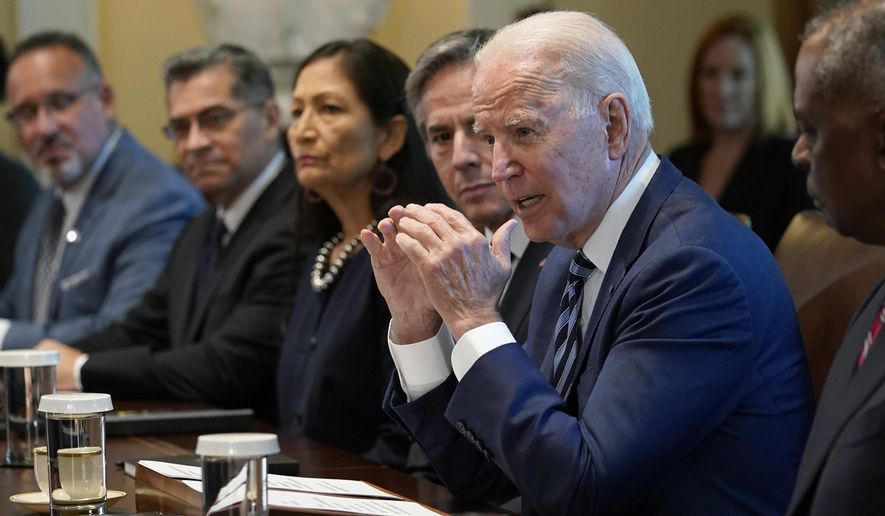OPINION:
The Russian invasion of Ukraine laid bare NATO’s weaknesses and the failure of free trade to enable secure borders and prosperity.
Since World War II, American policy has been premised on superior military and security commitments for friends and promoting commerce and prosperity through the World Trade Organization and regional trade agreements to make war a poor alternative to competition through commerce.
After the first Cold War, expanding the club to include former communist rivals has proven a disaster. Russia had used the economic gains from exports of gas and oil, agricultural commodities and metals to rebuild its military, stack up cyber weapons, hypersonic missiles and theater nuclear weapons.
Nuclear fear and European dependence on Russian gas have frozen NATO to inaction and limited the weapons supplied to Ukraine. It will next likely snatch Ossetia from Georgia, Moldova and perhaps the Baltics states.
China’s market socialist economy has exploited the system to steal industry and western jobs, build a military capable of capturing Taiwan and then blackmailing the West by withholding access to the island’s semiconductor fabs.
Unmanaged free trade makes no sense if it empowers autocrats to reign hell on smaller neighbors and China to potentially hold western democracies by the throat.
Unbridled free trade fills the pockets of terrorists like Saudi Crown Prince Mohammed bin Salman, who aids Russia by refusing to pump more oil. It enables India to frustrate western sanctions by selling Russia consumer goods and industrial materials and buying its oil. If an autocrat threatens the foundations of state sovereignty, kills innocent women and children and violates the most fundamental standards of decency required of civilized nations, then the non-aligned states should get aligned.
America and other western powers should note who equivocated about Russia’s crimes when shaping future commercial policy. Economists lecture that free trade creates value by promoting specialization, but its greater contribution is by broadening markets to increase R&D budgets. My work indicates that it likely contributes about 1 percentage point to U.S. GDP growth annually, but capturing all of those potential gains is simply not worth the risk of war.
The world is divided into three spheres. Western democracies — those account for about 60% of global GDP. Autocratic states that engage in domestic repression and international terrorism, scoff at a rules-based international order and pose an existential threat to democracy — China, Russia, Saudi Arabia, Iran and others that claim about one-third of GDP. And partially free and nonaligned states like Mexico and India.
We should be working in earnest to build and restore free trade relationships with western democracies and limit as much as possible trade and investment between the West and autocratic states.
We want to enable the technological progress in Europe, Japan and Australia and not unnecessarily add to the war and terrorism coffers in China, Russia, Saudi Arabia, Iran et. al.
And deal with the likes of India on a strictly transactional basis. Selling embargoed goods to and buying oil from Russia is akin to trading in fenced goods online amid an epidemic of looting.
We need to require our allies to arm up because anyone who thinks this is not a replay of the 1930s is playing a fool to history.
All of this is terribly difficult for Washington to digest. President Donald Trump thought he could cozy up with Vladimir Putin and bully Xi Jinping, and President Biden suffers three terrible disabilities.
Antony Blinken and his State Department believe diplomacy can solve all problems, and the Defense Department has grown woke and weak.
Mr. Biden is a captive of the labor movement, which is religiously protectionist, and hard-left progressives like socialists Bernie Sanders and Alexandria Ocasio-Cortez, West Wing policy advisers and regulatory appointees — all of who find some common cause with the suppression of dissent in China.
That’s hardly an overstatement. I find little daylight between the methods and penalties meted out by China’s Social Credit System — isolation and denial of employment opportunities — and the Cancel Culture among social media, NPR and NBC, American universities and the scheming palace royals that advise Mr. Biden.
He may lack the necessary energy but with Vice President Kamala Harris demonstrating little capacity for the top post, we are stuck. Still, like Presidents Franklin Roosevelt, John Kennedy and Barack Obama, he would do well to have some conservative Republicans in his cabinet to balance the advice he receives.
Kennedy’s Treasury secretary, C. Douglas Dillion, was President Dwight Eisenhower’s secretary of state, and Mr. Obama’s defense secretaries were Robert Gates and Chuck Hagel.
The White House is too much a hothouse of isolationism and left-wing statism to champion a strong defense and free markets in a dangerous world.
• Peter Morici is an economist and emeritus business professor at the University of Maryland and a national columnist.




Please read our comment policy before commenting.